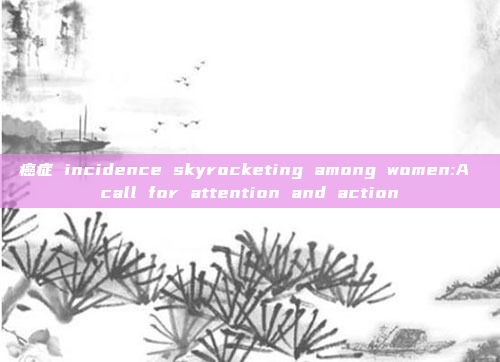癌症 incidence skyrocketing among women:A call for attention and action
In recent years, the incidence of cancer among women has been rising at an alarming rate worldwide. According to the World Health Organization (WHO), cancer is the leading cause of death among women, claiming millions of lives every year. This alarming trend has sparked a growing concern not only among medical professionals but also among the general public. Cancer is not a mere medical term; it is a silent epidemic that affects the lives of millions of women, causing emotional distress, financial burden, and irreversible damage to their health. It is time to confront this issue head-on and explore the reasons behind the increasing cancer rates among women.
The Increasing Cancer Rate Among Women
One of the primary reasons for the rising cancer incidence among women is the increase in lifestyle and environmental factors. Modern women are exposed to a variety of harmful substances and pollutants in their daily lives, such as air pollution, chemical additives in food and cosmetics, and radiation from medical imaging. These factors are known to contribute to the initiation and progression of various cancers, including breast cancer, ovarian cancer, and cervical cancer.

Additionally, the modernization of society has led to significant changes in women's roles and responsibilities. Once considered the "breadwinner" of the family, many women now balance careers with family responsibilities, leading to stress and burnout. This emotional strain can have a negative impact on their physical health, including an increased risk of cancer.
Genetic factors also play a role in the rising cancer incidence among women. Women carry two copies of each chromosome, which increases their risk of inheriting genetic mutations that can lead to cancer. However, it is important to note that genetics alone do not determine whether a woman will develop cancer. Environmental and lifestyle factors are equally, if not more, responsible for the increasing incidence.
The Psychological and Social Impact of Cancer
Cancer is not just a physical disease; it is a profound emotional and psychological challenge. For women who survive cancer, the impact is often long-lasting and far-reaching. The loss of a loved one to cancer can cause deep emotional pain, feelings of isolation, and a sense of helplessness. These psychological effects can lead to a higher rate of depression and anxiety, which in turn can worsen the quality of life for cancer survivors.
Moreover, cancer can disrupt the delicate balance of life for women, particularly those who are already dealing with the challenges of motherhood. The fear of cancer can prevent women from pursuing their careers or having the financial stability needed to support their families. This creates a Catch-22 situation where women are both deterred from seeking help and forced to shoulder the burden of their family's needs.
The societal expectations placed on women also contribute to the challenges of living with cancer. Many cultures and societies still hold traditional views that equate strength with the ability to ignore or suppress emotions. This can lead to a lack of support systems for women who are dealing with cancer, as they may fear appearing weak or vulnerable in the eyes of others.
The Role of Treatment and Prognosis
The treatment of cancer has come a long way in recent decades, with significant advancements in medical science and personalized medicine. However, the effectiveness of these treatments varies greatly, and many women are left with life-altering consequences, such as long-term disabilities, chronic conditions, and reduced quality of life. The psychological impact of these treatments is often underestimated, leading to a higher rate of mental health issues among cancer survivors.
Personalized medicine, which tailors treatments to individual genetic makeup, has shown promising results in improving outcomes for many women. However, this approach also requires a greater understanding of genetics and a willingness to incorporate it into daily life. This can be a significant barrier for many women, particularly those who lack access to advanced genetic testing or resources.
The Future of Cancer Treatment and Prevention
Looking ahead, the treatment of cancer will continue to evolve, with the potential for even more effective and less invasive therapies. Advances in immunotherapy, targeted cancer drugs, and gene editing technologies are just a few examples of the exciting developments in the field. These advancements have the potential to revolutionize cancer treatment, making it more effective and less debilitating for patients.
In addition to improved treatments, prevention is becoming an increasingly important area of focus. Early detection of cancer is one of the most effective ways to improve survival rates. However, many women are unaware of their risk factors, making it difficult to take proactive steps to prevent cancer. Education and awareness campaigns are essential to help women understand their risks and take appropriate precautions.
Conclusion
The increasing incidence of cancer among women is a multifaceted issue that requires a comprehensive approach to address. While medical advancements have improved the treatment of cancer, the psychological and social challenges faced by women continue to pose significant barriers to recovery. It is crucial for society to recognize the impact of cancer on women and to provide the support and resources needed to help them thrive.
In conclusion, cancer is not a mere medical diagnosis; it is a reality that many women are facing every day. By raising awareness, improving treatment options, and addressing the underlying social and psychological factors, we can make a meaningful difference in the lives of women with cancer. It is time to take action and prioritize the health and well-being of women, ensuring that they have access to the support and resources they need to overcome this disease. Only through collective effort and collaboration can we hope to turn the tide on the rising cancer incidence among women.







